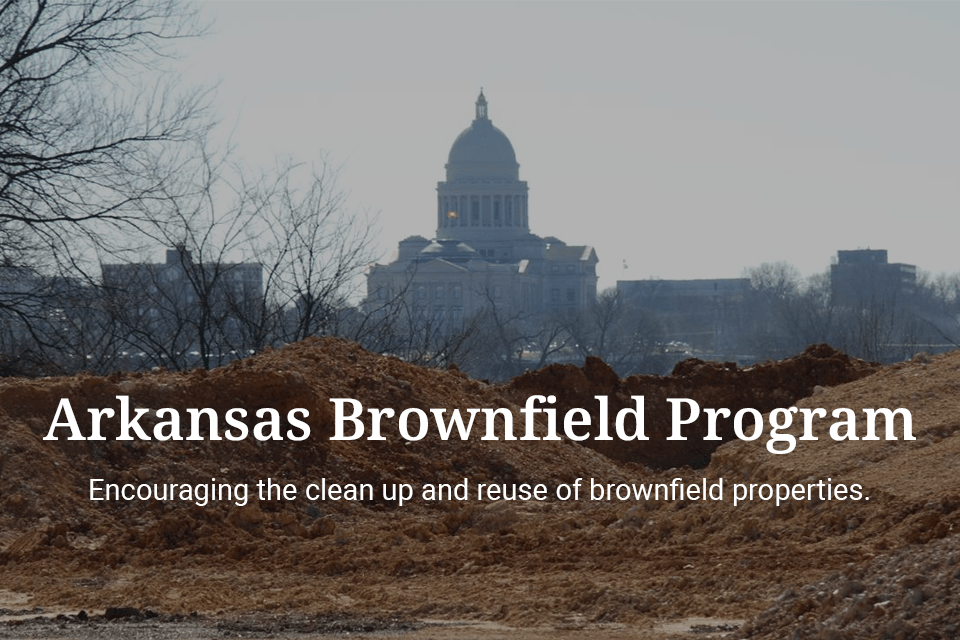
What is a brownfield?
A brownfield is a property where actual or suspected environmental contamination acts as a barrier to redevelopment. The purpose of the Arkansas Brownfield Program is to investigate potential environmental issues, determine appropriate cleanup actions, and prepare these brownfields for a reuse that supports economic or community development.
Benefits of Addressing Brownfields
Brownfields present a unique opportunity to reinvest in communities. Addressing brownfields can improve public health, eliminate blight, raise property values, increase local tax bases, provide jobs, and foster a sense of community.
Brownfield properties are often in key locations with existing infrastructure like roads and utility lines. Reusing these properties takes development pressures off of agricultural lands and greenspaces, preserving the farmlands and natural environments that characterize Arkansas.
As an incentive to repurpose brownfield properties, the Arkansas Brownfield Program offers liability protection under state law for parties who voluntarily clean up and reuse a brownfield property.
Brownfield Voluntary Cleanup Program
The Arkansas Voluntary Cleanup Act (Ark. Code Ann. § 8-7-1101 et seq.) encourages voluntary cleanup and redevelopment of abandoned properties by providing certain liability protections under Arkansas law. The Brownfield Redevelopment Rule (8 CAR pt. 82) describes the administrative process for the program.
The Brownfield Voluntary Cleanup Program (VCP) allows prospective purchasers to identify environmental issues and develop an approved cleanup plan before purchasing a property. Participants then remediate properties according to risk-based standards that consider site-specific conditions and the intended reuse of the property.
The general steps of the voluntary cleanup process are:
- Completing a comprehensive site assessment of the property
- Defining property reuse and evaluating cleanup options
- Selecting and implementing a cleanup method
- Conducting long-term oversight, as necessary
A detailed description of the process is laid out in the Brownfield Voluntary Cleanup Program User Guide.
After a cleanup has been successfully implemented, DEQ will issue a Brownfield Certificate of Completion (COC) which carries state-level liability protections for the new landowner. The COC and associated liability protections can be transferred to subsequent property owners upon coordination with DEQ.
Public participation is an integral part of the Brownfield Voluntary Cleanup Program. Public notice is required when DEQ enters into an Implementing Agreement with the participant and when DEQ proposes a cleanup action for the property. All assessments, agreements, plans, and reports generated during the process are considered a part of the public record and will be made available to the public during public comment periods and upon request, in accordance with the Arkansas Freedom of Information Act.
Interested applicants should apply to the Brownfield Voluntary Cleanup Program before purchasing a property. To apply for participation, please submit a Brownfield VCP Application Form.
Brownfield Assistance: Targeted Brownfield Assessments
Targeted Brownfield Assessments (TBAs) are free environmental investigations performed on behalf of public and non-profit entities and funded by federal grants. TBAs are conducted by state contactors and reviewed by DEQ staff. The requester is responsible for securing site access from the current property owner.
TBAs are available to:
- Local governments and units of government
- Economic and community development organizations
- Other quasi-governmental entities
- 501(c)(3) non-profit organizations
Private entities are not eligible for assessment funding assistance through the Arkansas Brownfield Program.
TBAs can include, but are not limited to:
- Phase I Environmental Site Assessments
- Phase II Environmental Site Assessments
- Phase II Comprehensive Site Assessments
- Asbestos Inspections
- Lead-Based Paint Inspections
- Cleanup Plans
Requests for TBAs are accepted year-round. Requests are prioritized based on potential for site reuse, expected benefits of reuse, community engagement and support, and the requestor's need. The amount of funding available for assessments varies based on current grant funding, and occasionally funds are unavailable until the next grant funding cycle.
To request a Targeted Brownfield Assessment, please reach complete the TBA Request Form.
Eligible entities may also request a Targeted Brownfield Assessment from the EPA Targeted Brownfields Assessment Program.
Brownfield Assistance: Cleanups
When contamination is found, cleanup actions may be required to safely reuse the property. DEQ has limited funding available for performing cleanups on behalf of public and non-profit entities. Requests for cleanup assistance are approved on a case-by-case basis as funding is available. Projects are prioritized based on the potential for site reuse, community engagement and support, and the requestor's need. Private entities are not eligible for cleanup funding assistance.
DEQ encourages public and non-profit organizations to apply for Federal assistance from the EPA Brownfields Program when funding is not available through the state program. To learn more about the types of grants available, visit EPA's Brownfields Program.
DEQ partners with the Kansas State University Technical Assistance to Brownfields Program (KSU TAB) to assist communities with grant writing, community engagement, and planning at no cost. To learn more about the services available, visit KSU TAB.
Ineligible Sites
Some types of sites are not eligible for participation in Arkansas Brownfield Program due to statutory requirements. These include:
- Sites proposed for or currently listed on the Superfund National Priorities List (NPL)
- Sites subject to orders or decrees under the Comprehensive Environmental Response, Compensation, and Liability Act (CERCLA)
- Sites subject to correct actions under the Resource Conservation and Recovery Act (RCRA)
- Sites owned by or under the control of the Federal government